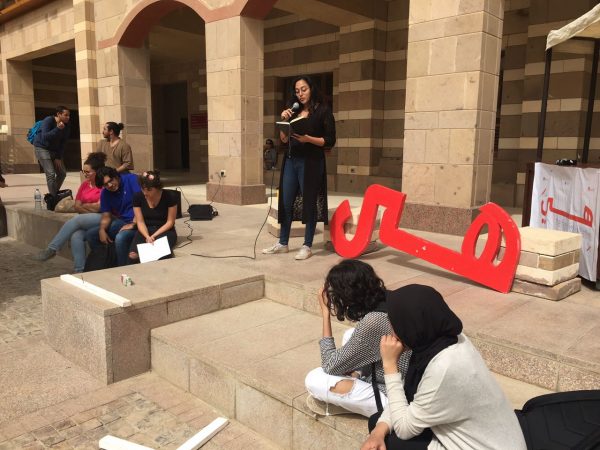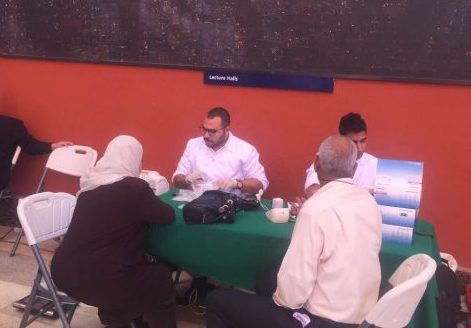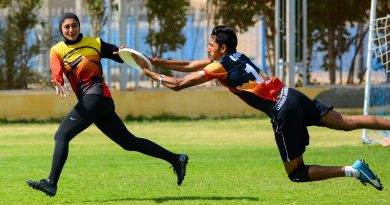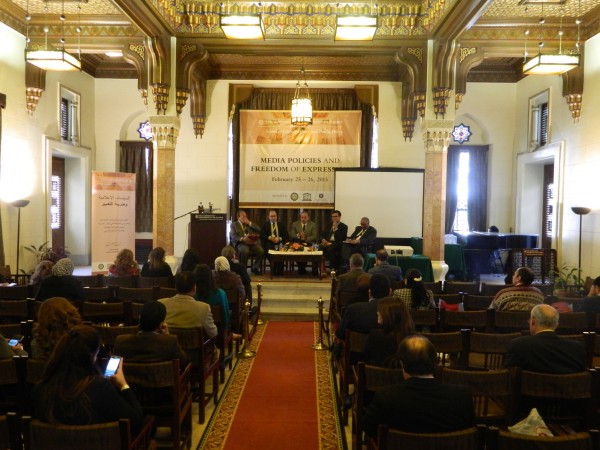Heya Commemorates Women’s Day in Poetry of Empowerment
By: Amy Ismail
Follow @aimyi
Heya: the Feminist Initiative is determined to continuously bring women’s issues to the fore, even beyond such global commemoration as International Women’s Day (IWD), celebrarted March 8§.
It recently organized AUC’s first Spoken Word poetry event which celebrated women and aimed ‘‘to create a space where we can discuss the experiences of women and showcase the talents on campus’’ said Heya’s Co-President Farah Abdul Gawad.
Standing in front of the Plaza Fountain at the Hatem Building during assembly hour last week, the poets focused on womanhood, gender and negotiating identity in the Arab World.
English and Comparative Literature Senior Bahira Amin recited her poem Woman, in honor of IWD.
‘‘I often feel the need to define myself as a woman in terms of different things, like upper class, hetrosexual etc.. things that have defined me but it is not all what a woman is”.
Amin was inspired by gender scholar Judith Butler, which reads: ‘‘if one is a woman that surely is not all one is.’’
Amin hopes that her poem would act as a vehicle for these types of gender issues.
The poem tackled issues such as intersexuality and what it means to be a woman.
“Sometimes a woman is queer and people tend to silence the voice of queer women,” said Amin.
In her second poem, Wide Ribs, she explored the body image of females, as well as coming to terms with what it means to be a woman, or as a person physically.
Amin told The Caravan that she views this as important as other intense issues addressed.
Self-image, body image and self-fulfilment are among the main concerns troubling women in the current age, which is why Amin decided to tackle them in “Wide Ribs”.
“Women are fighting a big fight against patriarchy, we have to make sure that we take care of ourselves, that we are safe in our bodies, that we are at home in our bodies.”
Anthropology Senior Aya Sharkawy recited three poems – Slow Boil, Delivery and Body/Grove/Battlefield/Grave.
“Just to stand on a raised platform and be given a microphone to raise my voice is both metaphorically and literally exactly what we need to be giving oppressed and marginalized communities. I loved it and would do it again and again,” she said.
The poem “Delivery” addressed several topics such as marriage, rape, motherhood and the paths a woman may want to take that are not always so welcoming.
“When writing Delivery I was feeling very contradictory emotions about womanhood and the expectations of being a woman, while also being in complete awe of the sacrifices the women I love made in pursuing the more conventional kinds of womanhood.”
Sharkawy considers the poem to be “an ode” to her predecessors and fellow women but also a declaration of independence.
While Sharkawy was writing Slow Boil she was “angry but in love”. She wanted to convey how love is about sacrifice, openness and giving but also show “that women are expected to be emotional slaves just spilling over to every whim of our men.”
“It’s not just about the men we love romantically but we perform so much emotional labor for our male friends and father’s and brothers not to mention our sons,” she said.
Moreover, Slow Boil engages with issues such as heterosexual love, platonic love and parental love between males and females, and how for it to be love, it cannot be built upon an abuse of privilege.
Abdul Gawad wants to use the momentum from the event to not only plan more events this semester but also make IWD “more” recognizable on campus and amongst the members of the community.
In the coming months, Heya will host the Umbrella Initiative, which combines elements of psychology and feminism, as well as an event at the end of the semester concerning women and law.




